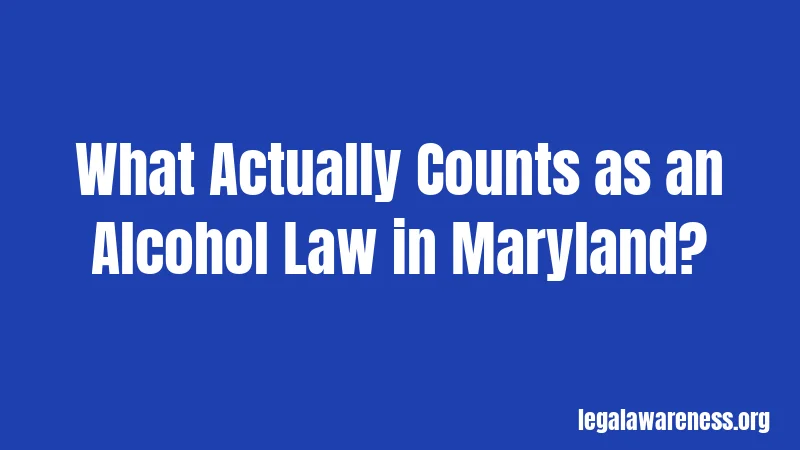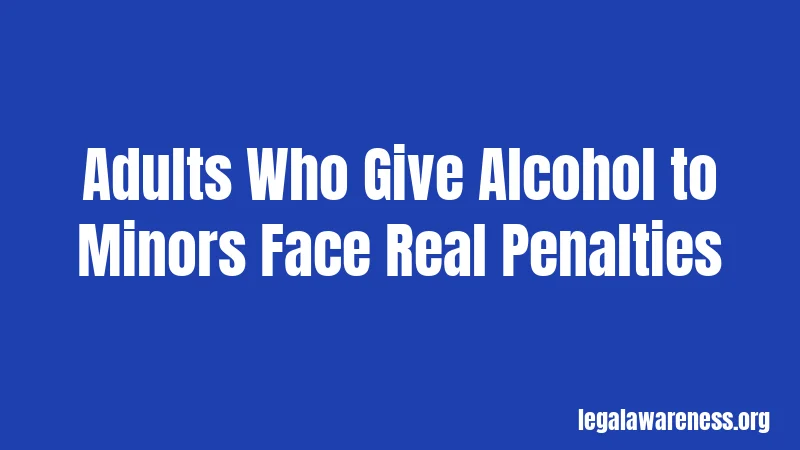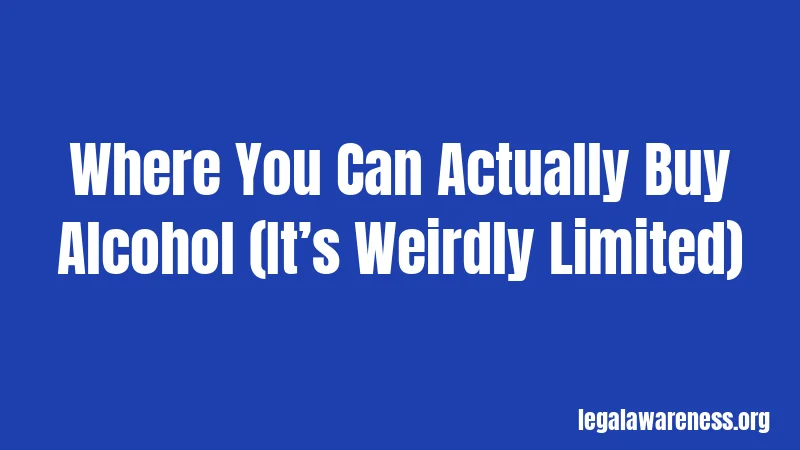Alcohol Laws in Maryland (2026): Avoid Costly Mistakes
Most people have no idea how strict Maryland’s alcohol laws actually are. Seriously. You might think you know the rules, but then something happens. You get pulled over. You find out a friend got arrested for something you didn’t think was illegal. And suddenly the penalties feel real.
Here’s the thing: Maryland’s alcohol laws vary depending on where you live (because counties have different rules), but the state laws are crystal clear. And if you break them? The consequences can hit hard. Let’s break down exactly what you need to know.
What Actually Counts as an Alcohol Law in Maryland?

Maryland’s alcohol laws cover way more than just drinking and driving. They cover where you can buy it. Who can sell it. What you can do with it in a car. How old you have to be. Pretty much everything.
The state’s Alcohol, Tobacco, and Cannabis Commission (ATCC) oversees the big picture. But here’s where it gets tricky—your county also has a say. This means some rules depend on where in Maryland you live. We’ll cover both the state laws and why county rules matter.
The Legal Drinking Age (And Yes, There Are Exceptions)
You must be 21 years old to buy, possess, or consume alcohol in Maryland. That’s the baseline. But like most laws, it’s more complicated than that.
Here’s what most people don’t know: Maryland actually allows some exceptions. A minor can drink alcohol at home if a parent or family member gives it to them. It’s legal. A minor can also drink alcohol as part of a religious ceremony, like communion. And if you’re under 21 but work for a restaurant or bar, you can handle alcohol during your job—you just can’t drink it.
Wondering what happens if you’re underage and caught with alcohol? You’ll get a citation, not an arrest. This is treated as a civil offense, not a criminal one. Your first violation costs you $500. Your second violation? That’s $1,000. But here’s the catch: if you’re caught for a second alcohol violation within five years, you’re automatically enrolled in Maryland’s Ignition Interlock Program. Even if you’re underage, even if you weren’t driving.
Adults Who Give Alcohol to Minors Face Real Penalties

Okay, this part matters if you’re an adult. If you knowingly give alcohol to someone under 21, Maryland comes down hard. Your first offense gets you a fine up to $2,500. For a second or later offense, you’re looking at $5,000.
What if you own a home and you let a minor drink there without being a family member? Same penalties apply. The law is basically saying: you can’t furnish alcohol to anyone under 21. Period. Even as a “one-time thing.”
Not sure what counts as furnishing alcohol? Let me break it down. If you buy it for them, that’s furnishing. If you let them drink at your house, that’s furnishing. If you give them money to buy it, that’s furnishing. Pretty much anything that results in them drinking counts.
Selling Fake IDs? That’s Its Own Nightmare
Here’s something most young people don’t realize. If you get caught selling fake IDs, Maryland doesn’t mess around. You’re looking at up to $2,000 in fines and up to two years in prison. And that’s per ID you sold. Sell five fake IDs? You could theoretically face ten years in prison and $10,000 in fines.
Plus, you’ll also be prosecuted under federal and homeland security laws. So you’re not just dealing with Maryland courts. This is serious.
Where You Can Actually Buy Alcohol (It’s Weirdly Limited)

Hold on, this part is important. Maryland is one of only three states in the entire country that doesn’t allow beer or wine to be sold in grocery stores. At all. Not at Giant, Safeway, Walmart, Target, or any chain store. You can’t get it at gas stations either.
The only exception? A handful of stores that were grandfathered in before 1978. These are mostly in Montgomery County, and even then, it’s limited. So where do you actually buy alcohol? Liquor stores. That’s basically it.
This law has been around for decades, but honestly, it confuses people. They walk into a grocery store thinking they can grab beer with their groceries. They can’t. It’s a Maryland thing.
Working With Alcohol: Age and Training Requirements
You must be at least 21 years old to serve alcoholic beverages in a bar or restaurant. But here’s the different rule: you can be 18 to work at a place that serves alcohol, as long as you’re not serving it.
Sound complicated? It’s actually straightforward. You’re 18? You can stock shelves at a liquor store, work as a host at a restaurant, or bus tables. You just can’t pour drinks. You have to be 21 for that.
Many counties also require alcohol server training, though the requirement varies by location. Frederick County, for example, requires managers to complete alcohol awareness training before renewal. Check with your county to be sure.
Open Container Laws: Keep It Sealed in Your Car
Listen up, because this one trips people up constantly. You cannot have an open container of alcohol anywhere in the passenger area of your vehicle. Not in a cup holder. Not in your hand. Not even opened and sitting on the seat behind you.
All previously opened bottles must go in your trunk. Period. This is a civil offense, which means it’s not as serious as a criminal charge, but it’s still a citation.
Here’s the thing though—some situations are exempt. If you’re a passenger in a hired vehicle (like a taxi or Uber), you can have an open container in the passenger area. Same with the living areas of RVs and motor homes. But if you’re in a regular car? Keep it sealed.
DUI and DWI: The Two Offenses You Need to Understand
Maryland treats DUI (Driving Under the Influence) and DWI (Driving While Impaired) as two separate crimes. They sound similar, but they’re different charges with different penalties.
DUI is the more serious offense. You can be charged with DUI if your blood alcohol content (BAC) is .08 or higher. That’s it. The law presumes you’re under the influence at that level. You don’t have to show signs of impairment. The test result is enough.
DWI is less serious but still no joke. You get charged with DWI if your BAC is below .08, but there’s clear evidence you’re impaired. This might include failing a field sobriety test, swerving, or slurred speech. It’s basically the state saying: “You’re clearly impaired, but your BAC wasn’t quite at the .08 threshold.”
Here’s the math: BAC between .05 and .08? You’re not legally presumed impaired, but you can still be charged with DWI if the officer finds evidence. BAC below .05? The law presumes you’re not impaired (though the state can still prove otherwise with other evidence).
If you’re under 21, the rules are stricter. You can be charged with DUI if your BAC is just .02 or higher. This is to discourage underage drinking and driving.
First DUI Conviction: What Actually Happens
Your first DUI conviction can result in up to one year in jail and a fine up to $1,000. But wait—Maryland recently increased these fines. As of June 1, 2025, the maximum fine for a first DUI is now $1,200.
Here’s what you need to know though: the judge has discretion. You might not get the maximum. You might get less. But you could also get the full year and $1,200 if the judge decides it’s warranted.
If you had a minor in the car when you got the DUI? The penalties double. You’re looking at up to two years in jail and up to $2,000 in fines.
Along with the jail time and fines, your license will be suspended for six months minimum. The court can also impose probation. And you’ll be required to complete an alcohol education program.
Second DUI Conviction (Within Five Years): This Gets Real
If you’re convicted of a second DUI within five years, the mandatory minimum jail time is five days. The maximum is two years. The maximum fine jumped to $2,400 as of June 2025.
But it gets worse if there was a minor in the car. Then you’re looking at up to three years in jail and up to $3,000 in fines.
Your license suspension gets longer too. You’re looking at up to one year of suspension. Plus, you must participate in alcohol education and likely a drug/alcohol assessment.
Third DUI and Beyond: This is Where It Gets Serious
A third DUI within five years means up to three years in jail and up to $3,000 in fines. Your license suspension extends to a full year or longer. And you’re definitely doing an alcohol and drug assessment.
After this point, you’re not just dealing with misdemeanor charges. You could be facing felony charges depending on circumstances. A DUI that causes an accident, property damage, or injury? That moves into felony territory fast.
DWI Penalties: Less Severe, But Still Real
First DWI: up to two months in jail and a $500 fine. Your license gets eight points. With a minor in the car, you’re looking at up to one year in jail and $1,000 fine.
Second DWI: up to one year in jail and a $500 fine. Your license gets eight more points. With a minor, it’s two years and $2,000.
Third DWI: up to three years in jail and $3,000 fine. This becomes serious business. You’re probably going to jail for this one.
Notice the difference? DUI penalties are consistently higher than DWI. But here’s the thing—DWI is still a criminal charge. It’s still on your record. It still costs you money and time.
License Suspension and the Ignition Interlock Program
When you’re arrested for DUI or DWI, the officer confiscates your license immediately. You get a temporary paper license that’s good for 45 days. Your actual suspension starts on day 46.
Here’s what happens next: you have between 10 and 30 days to request an MVA hearing to contest the suspension. If you don’t request a hearing, the suspension is automatic.
License suspensions range from 180 days to two years depending on your BAC level and prior convictions. High BAC (.15 or higher) triggers longer suspensions.
Now, the Ignition Interlock Program. This is something Maryland uses instead of revoking licenses completely. You have to install a device in your car that connects to the ignition system. Before the car starts, you blow into it. If it detects alcohol, the car won’t start.
For a second DUI or DWI within five years, you’re not just eligible for interlock—you might be required to participate. And yes, underage drivers with a second alcohol violation are automatically enrolled.
Open Your Eyes to These Aggravating Factors
Judges don’t just look at the BAC number. They look at the circumstances. Certain factors make penalties worse:
High BAC: If your BAC was .15 or higher, judges can impose harsher sentences. This is seen as a sign of severe impairment.
Minor in the vehicle: We’ve mentioned this a few times because it matters. Having a child in the car while you’re impaired triggers significantly higher penalties. Sometimes even felony charges.
Accident or property damage: If you caused an accident, hit a parked car, or damaged property? Your charges likely become more serious. Injured someone? You’re looking at felony charges.
Excessive speed or reckless driving: Combining DUI with speeding or weaving adds more charges and enhances penalties.
Previous convictions: Any DUI or DWI conviction within the past five years counts as a prior. This triggers mandatory minimum jail time.
Special Situations That Might Apply to You
Boating under the influence: Yes, this is a real law. You can be charged with BUI (boating under the influence). The penalties are similar to DUI—up to one year in jail and a $1,000 fine for a first offense.
Commercial driver’s license: If you hold a CDL and get a DUI, the penalties and license suspension rules are stricter. Your CDL can be suspended from your regular driver’s license independently.
Refusing a breath test: Here’s the thing Maryland calls “implied consent.” When you drive in Maryland, you’re automatically agreeing to submit to a breath, blood, or urine test if pulled over. Refusing the test is itself a violation. For a first refusal, the MVA suspends your license for 270 days. For a second or third refusal, it’s two years.
But wait—refusing doesn’t prevent your arrest. The officer can still arrest you for DUI based on other evidence. The refusal just adds another penalty on top of everything else.
Probation Before Judgment: A Second Chance for First-Time Offenders
Here’s a bit of good news. If you’re a first-time DUI offender, you might be eligible for Probation Before Judgment (PBJ). This is a diversion program where the court places you on probation without entering a formal conviction.
If you successfully complete the probation requirements, the conviction might not appear on your record. But here’s the catch: the arrest still shows up on your driving record. And the arrest still counts if you get a second DUI.
PBJ isn’t guaranteed. The judge has discretion. And if you had a PBJ within the past 10 years, you’re not eligible for another one.
The program typically includes probation supervision, alcohol education courses, and community service. It’s not free, but it’s better than a conviction on your record.
County Rules Matter: Montgomery County is Different
Remember how we said Maryland counties have local control? Here’s why it matters. Montgomery County operates differently from most other Maryland counties.
In Montgomery County, the county actually owns and operates the liquor stores. It’s called the “control model.” Other counties use a “licensing model” where private businesses get licenses to sell alcohol.
This affects hours of sale, which types of alcohol are available, and pricing. If you live in Montgomery County, check with the Alcohol Beverage Control (ABC) office for specific rules. They’re different from the rest of the state.
How to Check Your County’s Specific Rules
Since counties can have different rules, here’s what you should do:
Find your local liquor board. Every Maryland county has one. Search “[Your County Name] Maryland Liquor Board.” Most have websites.
Look for licensing information. The board’s site will tell you what types of businesses can sell alcohol, what hours they operate, and special restrictions.
Check for server training requirements. Some counties require it. Some don’t. Your county’s website will say.
Ask about local ordinances. Surprisingly, some jurisdictions have rules about open containers in public spaces or restrictions on certain types of alcohol.
Contact the board directly. If you’re unsure, call them. These offices exist to answer questions.
Frequently Asked Questions
If my BAC is .07, can I be arrested?
Yes. A BAC of .07 creates a presumption of DWI, which is a lesser offense than DUI but still a crime. You can absolutely be arrested for DWI at that level. It’s not “below the legal limit” in the way some people think.
Can I refuse a breath test?
Technically yes, you can refuse. But the MVA will suspend your license for 270 days on a first refusal. That’s just for refusing. You can still be arrested for DUI based on other evidence. Refusing doesn’t help you—it only adds another penalty.
Are there any circumstances where I can legally drink and drive a little bit?
No. There’s no safe amount of drinking and then driving. If you’ve consumed alcohol and your BAC is .08 or higher, you’re breaking the law. If you’re under 21 and your BAC is .02 or higher, you’re breaking the law.
Do I have to take an alcohol education class after a DUI?
Yes. It’s required by law. You can’t get out of it. It’s part of the sentence, not optional.
What if I’m from out of state and get a DUI in Maryland?
Maryland will suspend your out-of-state license just as it would a Maryland license. The suspension applies immediately. You’ll also have Maryland penalties (jail, fines, probation) on top of whatever your home state does when you return.
You’ve Got This, But Know the Reality
Maryland takes alcohol and driving seriously. The laws have gotten stricter over the past few years (remember those fine increases in June 2025?). Judges are not going easy on DUI and DWI cases.
But here’s what matters right now: you know the rules. You know the penalties. You know what can happen if you make a mistake. That knowledge is power.
If you’re facing charges, get a lawyer. Seriously. Don’t try to handle this alone. If you’re planning to drink, plan not to drive. Order a rideshare. Call a friend. Take public transit. Whatever it takes.
And if you have questions about Maryland’s specific alcohol laws, reach out to your county’s liquor board. That’s what they’re there for.
Stay smart out there. The penalties are real, but they’re all avoidable if you make the right choices.
